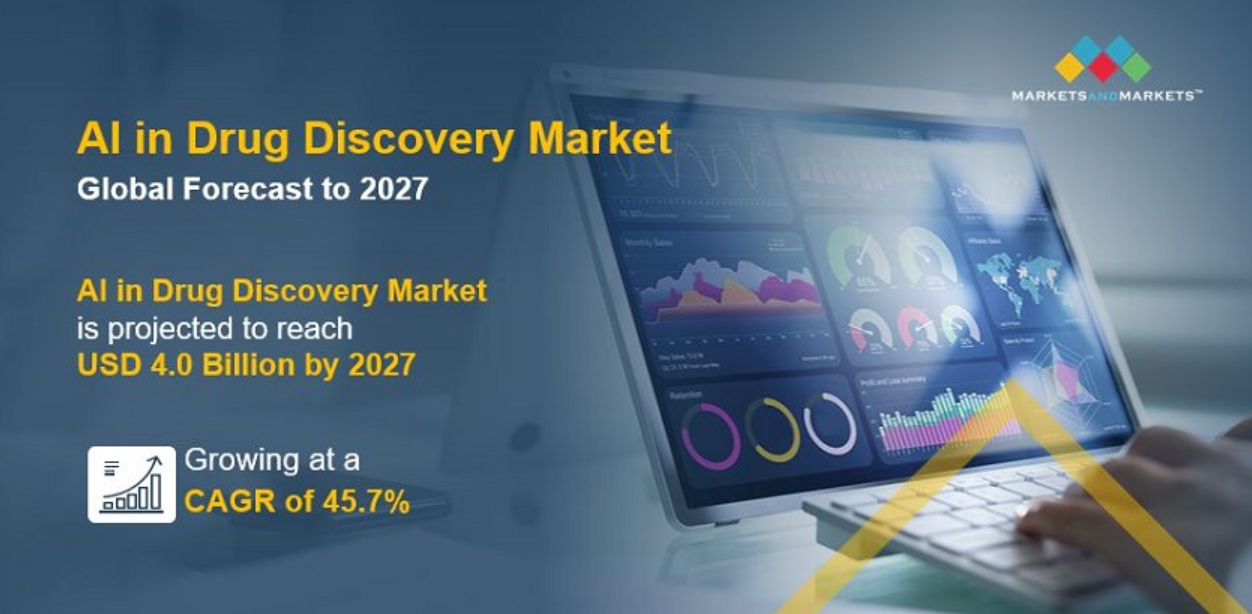
What You Should Know:
- The AI in Drug Discovery market in terms of revenue was estimated to be worth $600M in 2022 and is poised to reach $4B by 2027, growing at a CAGR of 45.7% from 2022 to 2027 according to a new report published by MarketsandMarkets™.
- The report cites the growing need to curb the drug discovery cost & reduce the overall time taken in this process, the rising adoption of cloud-based applications and services, and the impending patent expiry of blockbuster drugs are some of the key factors driving the growth of this market.
AI in Drug Discovery Market Macro & Micro Drivers
Macro-Level Drivers:
- Increasing Demand for Effective and Safe Therapeutics: The rising prevalence of complex diseases and the need for innovative and personalized treatment options drive the demand for more efficient and effective drug discovery processes. AI offers the potential to accelerate drug discovery, improve target identification, and optimize drug development, leading to the discovery of novel and safer therapeutics.
- Technological Advancements: Advancements in AI technologies, such as machine learning, deep learning, and natural language processing, have significantly improved the capabilities of AI in analyzing and interpreting complex biological data. These advancements enable the integration of diverse data sources, such as genomics, proteomics, and clinical data, leading to more comprehensive insights and faster decision-making in drug discovery.
- Availability of Big Data: The exponential growth of biological data, including genomic sequences, protein structures, and drug-target interactions, provides a rich source for AI-driven analysis and modeling. The availability of big data sets enables AI algorithms to identify patterns, predict compound properties, and generate novel hypotheses, facilitating more informed and data-driven decision-making in drug discovery.
Micro-Level Drivers:
- Cost and Time Efficiency: Traditional drug discovery processes are time-consuming, expensive, and prone to failure. AI-driven approaches offer the potential to reduce costs and time by streamlining various stages of drug discovery, such as compound screening, lead optimization, and clinical trial design. AI algorithms can quickly analyze vast libraries of compounds, prioritize candidates, and predict their properties, leading to faster and more efficient drug development.
- Target Identification and Validation: AI can aid in the identification and validation of potential drug targets by integrating and analyzing diverse data sources, including genomic, proteomic, and clinical data. By identifying novel targets and elucidating their biological mechanisms, AI enables researchers to develop targeted therapies with higher efficacy and specificity.
- Drug Repurposing and Combination Therapy: AI algorithms can analyze large databases of existing drugs and their known interactions to identify opportunities for drug repurposing. By repurposing existing drugs for new indications or exploring drug combinations, AI can accelerate the development of new treatment options and increase the success rate of clinical trials.
- Personalized Medicine and Precision Healthcare: AI-driven approaches facilitate the integration of patient data, including genetic profiles and clinical parameters, to develop personalized treatment strategies. By identifying patient subgroups and predicting individual responses to therapies, AI enables precision medicine approaches that optimize treatment outcomes and minimize adverse effects.
These macro and micro-level drivers collectively contribute to the growth of the AI in drug discovery market, fostering innovation, improving efficiency, and advancing the development of safe and effective therapeutics.
For more information about the report, visit https://www.marketsandmarkets.com/Market-Reports/ai-in-drug-discovery-market-151193446.html
